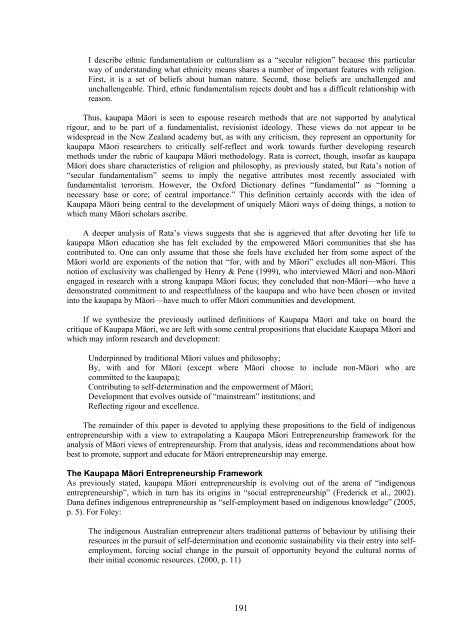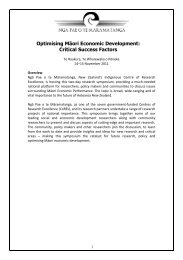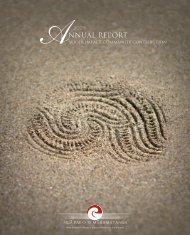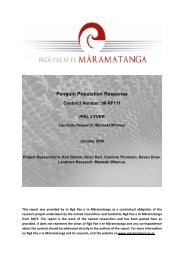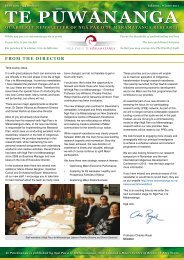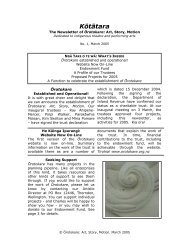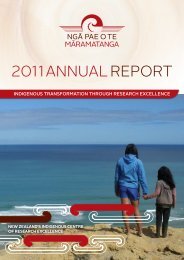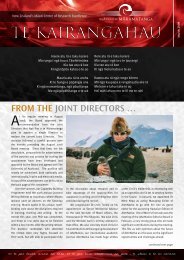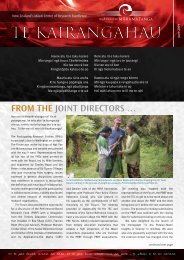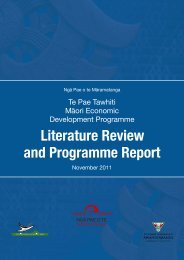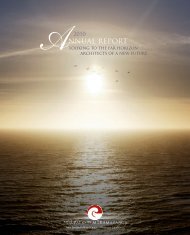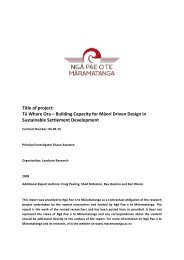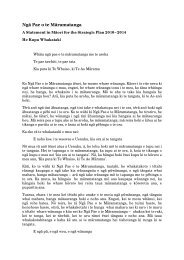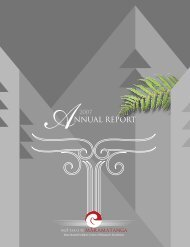traditional knowledge conference 2008 te tatau pounamu
traditional knowledge conference 2008 te tatau pounamu
traditional knowledge conference 2008 te tatau pounamu
You also want an ePaper? Increase the reach of your titles
YUMPU automatically turns print PDFs into web optimized ePapers that Google loves.
I describe ethnic fundamentalism or culturalism as a “secular religion” because this particularway of understanding what ethnicity means shares a number of important features with religion.First, it is a set of beliefs about human nature. Second, those beliefs are unchallenged andunchallengeable. Third, ethnic fundamentalism rejects doubt and has a difficult relationship withreason.Thus, kaupapa Māori is seen to espouse research methods that are not suppor<strong>te</strong>d by analyticalrigour, and to be part of a fundamentalist, revisionist ideology. These views do not appear to bewidespread in the New Zealand academy but, as with any criticism, they represent an opportunity forkaupapa Māori researchers to critically self-reflect and work towards further developing researchmethods under the rubric of kaupapa Māori methodology. Rata is correct, though, insofar as kaupapaMāori does share charac<strong>te</strong>ristics of religion and philosophy, as previously sta<strong>te</strong>d, but Rata’s notion of“secular fundamentalism” seems to imply the negative attribu<strong>te</strong>s most recently associa<strong>te</strong>d withfundamentalist <strong>te</strong>rrorism. However, the Oxford Dictionary defines “fundamental” as “forming anecessary base or core; of central importance.” This definition certainly accords with the idea ofKaupapa Māori being central to the development of uniquely Māori ways of doing things, a notion towhich many Māori scholars ascribe.A deeper analysis of Rata’s views suggests that she is aggrieved that af<strong>te</strong>r devoting her life tokaupapa Māori education she has felt excluded by the empowered Māori communities that she hascontribu<strong>te</strong>d to. One can only assume that those she feels have excluded her from some aspect of theMāori world are exponents of the notion that “for, with and by Māori” excludes all non-Māori. Thisnotion of exclusivity was challenged by Henry & Pene (1999), who in<strong>te</strong>rviewed Māori and non-Māoriengaged in research with a strong kaupapa Māori focus; they concluded that non-Māori—who have ademonstra<strong>te</strong>d commitment to and respectfulness of the kaupapa and who have been chosen or invi<strong>te</strong>dinto the kaupapa by Māori—have much to offer Māori communities and development.If we synthesize the previously outlined definitions of Kaupapa Māori and take on board thecritique of Kaupapa Māori, we are left with some central propositions that elucida<strong>te</strong> Kaupapa Māori andwhich may inform research and development:Underpinned by <strong>traditional</strong> Māori values and philosophy;By, with and for Māori (except where Māori choose to include non-Māori who arecommit<strong>te</strong>d to the kaupapa);Contributing to self-de<strong>te</strong>rmination and the empowerment of Māori;Development that evolves outside of “mainstream” institutions; andReflecting rigour and excellence.The remainder of this paper is devo<strong>te</strong>d to applying these propositions to the field of indigenousentrepreneurship with a view to extrapolating a Kaupapa Māori Entrepreneurship framework for theanalysis of Māori views of entrepreneurship. From that analysis, ideas and recommendations about howbest to promo<strong>te</strong>, support and educa<strong>te</strong> for Māori entrepreneurship may emerge.The Kaupapa Māori Entrepreneurship FrameworkAs previously sta<strong>te</strong>d, kaupapa Māori entrepreneurship is evolving out of the arena of “indigenousentrepreneurship”, which in turn has its origins in “social entrepreneurship” (Frederick et al., 2002).Dana defines indigenous entrepreneurship as “self-employment based on indigenous <strong>knowledge</strong>” (2005,p. 5). For Foley:The indigenous Australian entrepreneur al<strong>te</strong>rs <strong>traditional</strong> pat<strong>te</strong>rns of behaviour by utilising theirresources in the pursuit of self-de<strong>te</strong>rmination and economic sustainability via their entry into selfemployment,forcing social change in the pursuit of opportunity beyond the cultural norms oftheir initial economic resources. (2000, p. 11)191


